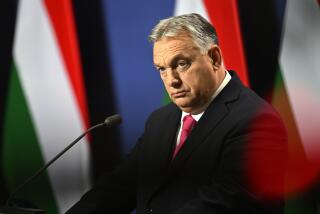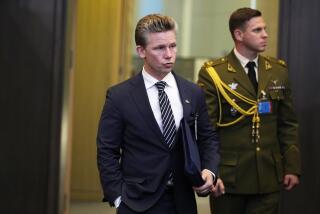NATO Urges Approval of Arms Pact Before Summit
- Share via
BRUSSELS — The NATO allies told Secretary of State George P. Shultz today that settlement of technical disputes over the U.S.-Soviet arms treaty should spur the Senate to ratify it before the superpower leaders meet in Moscow.
“We think the way is now open for the treaty to be ratified” before President Reagan meets Soviet leader Mikhail S. Gorbachev on May 29, said David Mellor, a British minister of state.
American and allied officials have expressed concern that failure to ratify the treaty before the summit could spoil the atmosphere in Moscow and set back efforts to reach other arms control deals. Reagan and Gorbachev signed the pact in Washington in December.
Allied Officials Briefed
Shultz briefed allied officials on his two days of talks in Geneva with Soviet Foreign Minister Eduard A. Shevardnadze. In Geneva, the two sides resolved differences over how to ensure compliance with the treaty.
A further dispute arose after Shultz and Shevardnadze had pronounced the problems resolved, and lower-level officials on both sides argued through the night before settling the matter shortly after dawn.
Shultz told reporters that he was pleased with the outcome but declined to say whether he thought the Senate would be satisfied. The Senate on Monday postponed debate on the treaty after some members accused Moscow of backsliding and leaving loopholes for possible cheating.
“All the issues that anyone has raised have been squared away,” Shultz told a news conference before flying back to Washington.
“It is the unanimous view of the allies that ratification prior to the summit is very desireable from their standpoint,” Shultz said, adding that this view was made clear in his meeting at NATO.
The treaty calls for elimination of the superpowers’ medium-range land-based nuclear missiles, which have ranges of 310 to 3,100 miles.
Size of Canisters
The dispute that erupted in Geneva on Thursday night centered on the question of the size of canisters that could leave a Soviet missile assembly plant at Votkinsk without being subject to U.S. inspection.
More to Read
Sign up for Essential California
The most important California stories and recommendations in your inbox every morning.
You may occasionally receive promotional content from the Los Angeles Times.










